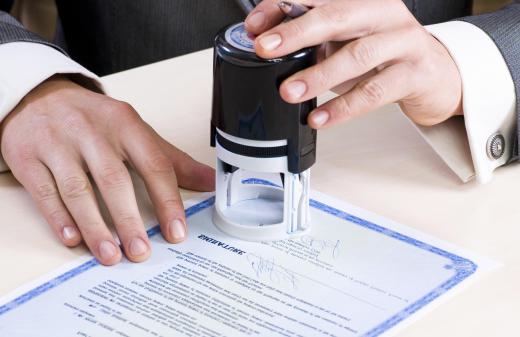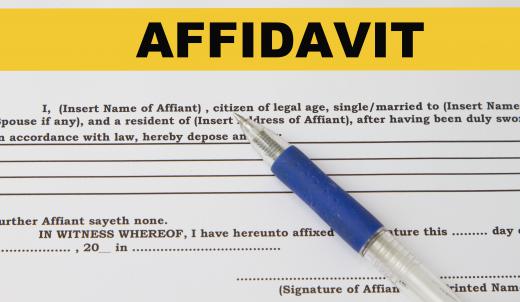At MyLawQuestions, we're committed to delivering accurate, trustworthy information. Our expert-authored content is rigorously fact-checked and sourced from credible authorities. Discover how we uphold the highest standards in providing you with reliable knowledge.
What is a Notarized Affidavit?
An affidavit is a document executed under oath and setting forth facts as known or believed by the person making the affidavit, called the affiant. When executed before a notary, the document is known as a notarized affidavit. Under limited circumstances, a notarized affidavit may be accepted in the place of witness testimony in court cases; a notarized affidavit will also routinely be executed in many circumstances that don’t involve appearances before a judge.
An affidavit differs from testimony in court or a deposition in that the affiant makes a completely voluntary statement and is neither questioned nor cross-examined. While both appearances in court and depositions may be compelled by the court, affidavits may not be compelled because, as noted, they are purely voluntary.

When made in the first person, an affidavit usually begins with a statement identifying the affiant, including his address, and asserting his competence to execute the affidavit. When made in the third person, as in the case of guardians executing affidavits for their incompetent children or parents, the nature of the relationship must be made clear in the affidavit, as well as their authority to make the affidavit. An affidavit must also indicate both the place and the date it was executed.

There is no generally required form that a notarized affidavit must take, except that it should be restricted to a statement of facts. It’s not appropriate to include argument, characterization, or judgments in an affidavit. Facts should be set forth clearly and definitively, and when they’re based on the affiant’s information rather than personal knowledge, the source of that information should be made clear. For example, the statement, “I saw the car hit the tree,” is based on personal knowledge; “the driver was drunk,” is information, and “I knew the driver was drunk because it was reported in the newspaper,” sets forth the information and identifies its source.

The fact that an affidavit is a statement of fact that will be relied upon in legal proceedings makes it essential that it be executed under oath. The document does not become an affidavit until the affiant is placed under oath and executes it at that point. The person who takes the affidavit — a notary, court clerk, or commissioner of deeds, for instance — will administer the oath to the affiant, who then executes the affidavit by signing it. The official will then sign the document, indicating the source of his or her authority to administer oaths. In the United States, a notary will indicate her title of office, the country of jurisdiction, and the expiration date of the notary commission. All this information is recorded at the bottom of a notarized affidavit. A notary seal is not required, but is often impressed by the notary.
AS FEATURED ON:
AS FEATURED ON:
















Discuss this Article
Post your comments